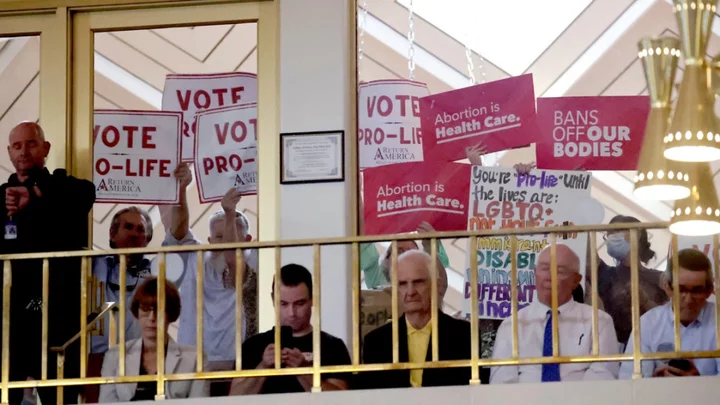
Key abortion debates this week in US courts and statehouses
Abortion opponents are trying again to implement restrictions in the latest round of court and legislative action on the divisive issue. This round of efforts centers on states that have considered bans before and a policy that's been bouncing around federal courts. Here are key things to know about the latest developments in the saga of how abortion policy will settle after the U.S. Supreme Court last year overturned Roe v. Wade and the nationwide right to abortion. PURPLE STATE POLICY Since the Dobbs ruling last year, tighter abortion restrictions have been enacted in most Republican-controlled states and protections of abortion access have gone into effect in most that are dominated by Democrats. But there hasn't been such a uniform story in the 11 states with divided government control. Virginia has kept its status quo, for instance, while Vermont has adopted a constitutional amendment to preserve abortion access and Louisiana and Kentucky have bans in place. Change came quickly in North Carolina in April when one state lawmaker flipped from Democrat to Republican, giving the GOP enough votes to override gubernatorial vetoes. Lawmakers promptly passed a ban that's less restrictive than most — allowing abortion for the first 12 weeks of pregnancy, which would be among the least restrictive of the new bans. Democratic Gov. Roy Cooper vetoed it. But lawmakers on Tuesday overrode that veto and the new law is set to take effect July 1. TRYING AGAIN ON BANS IN NEBRASKA, SOUTH CAROLINA Nebraska and South Carolina are both Republican-dominated states where GOP lawmakers have struggled to agree on the details of abortion bans. Both are considering bans this week, just weeks after earlier efforts narrowly fell short on procedural votes. And both have resurrected legislation that's less restrictive than versions that were rejected previously. In South Carolina, Republican lawmakers were divided on whether to ban abortion at all stages of pregnancy or only after cardiac activity can be detected — generally around six weeks, often before women know they're pregnant. A version of a less stringent ban is now under consideration. In Nebraska, lawmakers balked at a ban after six weeks. The unique unicameral legislature is now considering a ban on abortion at 12 weeks' gestation. It's been added to a bill that would also ban gender-affirming care for minors. RESTRICTION IN MONTANA In Montana, Gov. Greg Gianforte signed a ban Tuesday on dilation and evacuation abortions, which are normally performed in the second trimester of pregnancy. A legal challenge is expected. And it wouldn't be the first challenge on the policy in the state. A judge ruled last month that she would not block the ban preemptively, before it was signed into law. The state in 2021 adopted a broader ban on abortions after 20 weeks of pregnancy, but the state Supreme Court ruled that it will not enforce it pending a court challenge, leaving abortions by some means legal until viability, around the 24th week. COURT ARGUMENTS ON AN ABORTION PILL Most of the legal battles on abortion since the Supreme Court’s Dobbs decision in 2022 have centered on whether individual state constitutions protect the right to abortion. But one has implications nationally. An anti-abortion group sued seeking to rescind the U.S. Food and Drug Administration’s 2000 approval of mifepristone, one of two drugs used in combination in most medication-induced abortions in the U.S. A federal judge in Texas agreed. The New Orleans-based 5th U.S. Circuit Court of Appeals is hearing arguments Wednesday on the matter. In the meantime, the U.S. Supreme Court has said that mifepristone can remain on the market. It is already barred from being used in abortions, with some exceptions, in states with bans in place. An immediate response from the circuit court is unlikely. The case is expected to return to the nation’s top court eventually. The Texas-based case could be merged with one in Washington, where another federal judge ruled last month that mifepristone restrictions cannot be rolled back in a group of Democrat-led states that filed lawsuits. Read More Ukraine war’s heaviest fight rages in east - follow live Charity boss speaks out over ‘traumatic’ encounter with royal aide Arab foreign ministers welcome Syria's return to the Arab League ahead of Jeddah summit Hamas calls on Palestinians to confront Israeli victory parade in Jerusalem Tiny Amerindian village in Guyana fights gold mine in key court battle over indigenous land rights
2023-05-17 22:56

Abortion Pill Ban Gets a Second Chance in Appeals Court
The nationwide abortion-pill ban ordered by a Texas federal judge last month but partially stayed by the US
2023-05-17 22:52
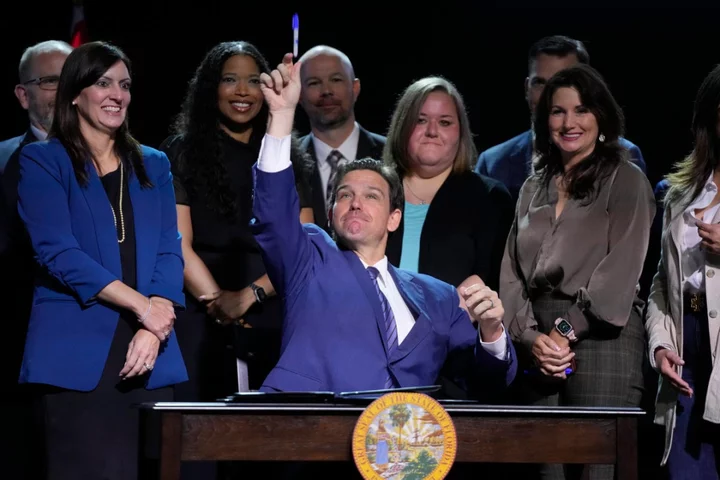
DeSantis reacts to Trump implying Florida abortion ban is ‘too harsh’ as 2024 fight heats up
Gov Ron DeSantis criticised Donald Trump on Tuesday for implying Florida's new six-week abortion ban is “too harsh,” stepping up his attacks on the former president as he prepares to challenge him for the 2024 Republican nomination. Mr DeSantis was responding to a question about Mr Trump's comments in an article published Monday by The Messenger about the six-week ban the Florida governor recently signed into law. “Many people within the pro-life movement feel that that was too harsh,” Trump told the online outlet. Mr DeSantis contended the law has widespread support among opponents of abortion and noted the former president didn't say what limits he would back on the procedure. “Protecting an unborn child when there’s a detectable heartbeat is something that almost 99 per cent of pro-lifers support,” Mr DeSantis said at a news conference in Florida, taking questions after he signed a measure to combat human trafficking. “As a Florida resident, you know, he didn’t give an answer about, ‘Would you have signed the heartbeat bill that Florida did, that had all the exceptions that people talk about?’” Mr DeSantis added. The rivalry between Mr Trump and Mr DeSantis is heating up as the Florida governor nears a decision on a 2024 presidential bid. Mr DeSantis allies believe he will launch his candidacy as soon as this week, although an announcement could come closer to the end of the month. Abortion has been an early flashpoint in the still-forming Republican primary field ahead of the first presidential election since the Supreme Court overturned Roe v Wade. The bickering showcases the GOP's ongoing internal debate over hard-line abortion restrictions, which may be popular in a Republican primary but could create problems in a general election for the party's eventual nominee. The bill signed into law last month by Mr DeSantis would ban abortions after six weeks of pregnancy. It will take effect only if the state’s current 15-week ban is upheld in a legal challenge before the state Supreme Court, which is controlled by conservatives. “Ron DeSantis is flailing in the polls and is closer to the bottom of the pack than he is to President Trump, who is dominating in every single poll,” Trump campaign Steven Cheung said when asked to respond to DeSantis' remarks. Cheung pointed out an anti-abortion group's recent characterization of Trump's presidency as “the most consequential in American history for the pro-life cause.” Mr Trump has referred to himself as “the most pro-life president in American history,” as his three nominations of conservative judges to the Supreme Court paved the way for the end of legalized abortion nationwide. But in the early months of his 2024 bid, Mr Trump has often sidestepped the issue of abortion, even as Republicans across the country celebrate the Supreme Court decision stripping federal constitutional rights to the practice. In Iowa in March, he repeatedly refused to say whether he would support a federal law restricting abortion in every state — a move that anti-abortion activists have been demanding of the GOP’s presidential contenders. “We’re looking at a lot of different things," he said when asked by The Associated Press whether he supports a federal abortion ban. Last week during a primetime CNN town hall in New Hampshire, Mr Trump continued to avoid specifics on a national ban, repeatedly saying he would “do what’s right,” without specifying what that was. As he gets closer to an announcement, Mr DeSantis has been escalating his criticism of Mr Trump, who for months has been attacking him directly and through groups supporting his candidacy. Last week in Iowa, as perilous weather sidelined Mr Trump’s trip to the state, Mr DeSantis highlighted the GOP’s recent string of electoral losses — a clear knock on the former president. “We must reject the culture of losing that has impacted our party in recent years. The time for excuses is over,” Mr DeSantis said at an event in Sioux Center. “If we get distracted, if we focus the election on the past or on other side issues, then I think the Democrats are going to beat us again.” Read More Trump news – live: John Durham’s report on Trump-Russia probe attacks FBI as Giuliani accused of sexual abuse Oral sex on Trump calls and pardons for sale: The most disturbing allegations from the Giuliani lawsuit Disney asks judge to dismiss DeSantis-appointed board's lawsuit in latest tit-for-tat Ukraine war’s heaviest fight rages in east - follow live Charity boss speaks out over ‘traumatic’ encounter with royal aide
2023-05-17 22:26
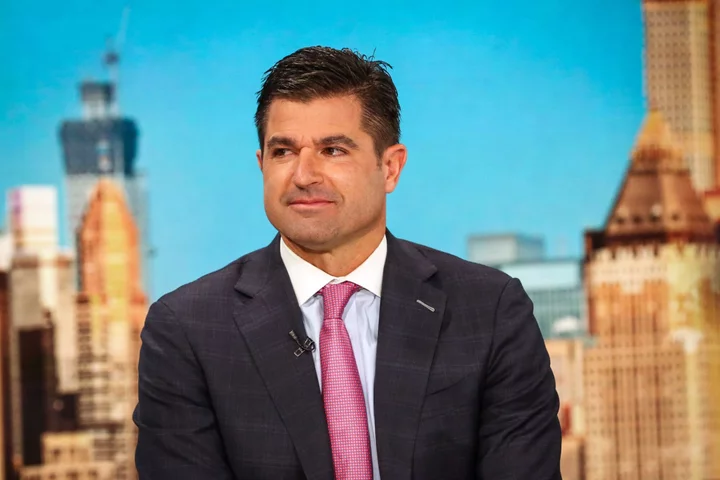
Theme Park Boss Urges Sunak to Reverse Tourism Tax
The new boss of Alton Towers-owner Merlin Entertainments Ltd. has urged the UK government to bring back a
2023-05-17 16:26

EU Spat Over Nuclear Energy Escalates as Key Vote Is Delayed
A key European Union law on scaling up renewable energy has been delayed amid last-minute wrangling over the
2023-05-17 15:49

Top UK Rolex Retailer Expects First-Quarter Sales Decline
Watches of Switzerland Group Plc, the top seller of Rolex timepieces in the UK, expects first quarter sales
2023-05-17 15:27

Singapore Air’s Record Results Leave Rival Cathay in Wake: Chart
Singapore Airlines Ltd. reported record annual results despite flying at 78% of pre-Covid capacity and carrying almost 10
2023-05-17 13:23
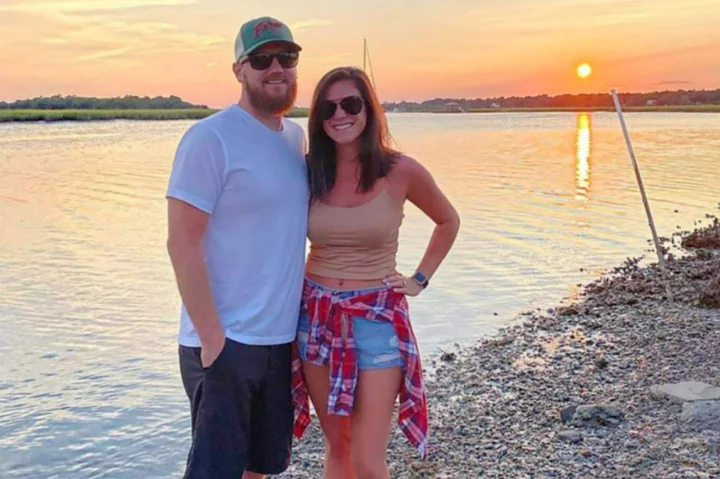
Man whose wife was killed in wedding night crash speaks out on horrific ordeal
A man who was severely injured and whose wife was killed in an auto accident on the night of their wedding in South Carolina is describing his experience. “My body’s getting back to where I can manage, I guess,” Aric Hutchinson told WCSC on Saturday during a memorial for his wife Samantha Miller, 34, held in Folly Beach, South Carolina. “It’s just as good as I can feel with the situation, but obviously, today and the outpouring of people was just amazing,” he added. “I know Sam would love it.” The beach on the island off the coast of Charlotte North Carolina was where the couple was married. On 28 April, Mr Hutchinson, Miller, and two others were leaving their wedding reception in a golf cart equipped with lights and licensed to drive at night. Police say Jamie Lee Komoroski, 25, slammed into the cart from behind, sending Mr Hutchinson flying 100 yards away from the vehicle. He suffered a brain injury and broken bones as a result of the crash, and was in a wheelchair at Saturday’s memorial. Ms Komoroski, who was allegedly drunkenly driving 65mph in a 25mph zone in a rental car, was arrested and charged with one count of reckless homicide and three counts of felony DUI resulting in great bodily harm. Witnesses told police the crash was like a “loud explosion going off,” while another described Ms Komoroski saying aloud, "I did nothing wrong”. Ms Komoroski had a blood alcohol level three times the legal limit in South Carolina, according to police, and told police she had multiple drinks the night of the crash after refusing to perform a field sobriety test. "Words cannot express how devastated we are by her loss," XenTegra, the North Carolina IT company where Miller worked, said in a statement to NBC News. “She carried a light about her, one that shined so brightly upon everyone with whom she interacted. Simply put, Samantha brought an abundance of joy and laughter to the workplace.” Read More Drunk driver who killed bride on wedding day had blood alcohol level three times over the legal limit Newlywed bride killed after drunk driver hits her golf cart immediately after wedding Family of dead bride urges drivers not to drive drunk
2023-05-17 12:19

Nebraska Republicans approve combined gender-affirming care ban and anti-abortion bill after epic filibuster
For three months, a group of Nebraska lawmakers have ground nearly all legislative business in the state to a halt, grabbing the nation’s attention with a remarkable filibuster to stifle a bill that would end gender-affirming care for young transgender people. Late Tuesday 16 May, Republican lawmakers broke through, advancing a bill that not only bans gender-affirming care for trans people under 19 years old but also tacks on an amendment to outlaw abortion at 10 weeks of pregnancy and hands the state’s GOP-appointed medical officer the authority to set the rules for affirming care for trans youth. Lawmakers approved the amended version of legislative bill 574 by a vote of 33-14. The measure will go to a final round of votes before it heads to the desk of Republican Governor Jim Pillen, who intends to sign it into law. Hundreds of protesters filled the capital in Lincoln, standing outside the doors and in the gallery above lawmakers while chanting “one more vote to save our lives”; only one senator would have had to defect from supporters of the bill to kill the legislation. The vote – on the 78th day of a 90-day session – followed a series of maneuvers that opponents argued were bending and breaking the rules of the state legislature to hammer through the legislation and avert the filibuster, which would allow opponents to occupy their allotted time to speak the bill to death. “What you are attempting to do today is the lowest of the absolute lows,” state Senator Machaela Cavanaugh, who spearheaded the filibuster, told Republican lawmakers. “You literally have to cheat at every moment of this debate in every possible way. … You are allowing it to happen,” she added. “You do literally have blood on your hands, and if you vote for it, you will have buckets.” State Senator Megan Hunt, the first openly LGBT+ member of the state legislature and the mother of a trans child, lambasted lawmakers for their “escape routes” from the capitol to avoid facing protesters. “If you can’t go out and face them, you are not worthy,” she said. “Your legacy is filth.” In a statement following the vote, Governor Jim Pillen called the bill “an important step” to “protect” the future of the state’s children. Opponents of the bill forcefully opposed the inclusion of an abortion ban in a bill targeting gender-affirming care, two wholly separate issues combined into one, “but you all don’t care,” Ms Cavanaugh told Republican lawmakers. “You don’t care about due process, you don’t care about the people of Nebraska,” she added. “All you care about is the governor.” Abortion rights advocates and transgender rights advocates have frequently underscored the fact that anti-abortion measures and legislation targeting LGBT+ people are driven by the same lawmakers and activist groups, relying on similar arguments to restrict access to healthcare, with measures that have dominated state capitals across the country over the last few years. Lawmakers initially were set to only debate the gender-affirming care bill, which already went through two of three rounds of debate and votes. But legislative rules prohibit amendments on a final round, and opponents of the bill planned to filibuster through all two hours of debate to continue to block it. Last month, the filibuster blocked a measure from anti-abortion lawmakers to ban abortion at roughly six weeks of pregnancy. Attaching another anti-abortion measure, this time at roughly 10 weeks, gave proponents of the bill a second chance of both advancing an anti-abortion law and the gender-affirming care ban, marrying two controversial measures to get to the necessary 33-vote threshold to advance. In February, Ms Cavanaugh vowed to “burn the session to the ground” if the ban on gender-affirming care advanced, launching an epic filibuster that blocked every bill until the measure was withdrawn or defeated. State Senator Kathleen Kauth, an Omaha Republican who proposed the bill targeting gender-affirming care, said the amended version would protect children from what she called a “social contagion.” “Kids deserve the right to grow up and not deal with this until they are adults and can make informed decisions,” said Ms Kauth, who did not mention the fact that such decisions are made with families and their doctors. The anti-abortion measure provides no exceptions for pregnancies with fatal fetal anomalies and does not explicitly protect doctors who perform abortions from criminal prosecution. “What is wrong with you?” said Ms Hunt, calling the combined bill a “desperate attempt to institute an abortion ban that is unpopular, unnecessary, and unsafe.” More than a dozen states, mostly in the US South, have severely restricted or effectively outlawed abortion in the year after the US Supreme Court struck down Roe v Wade, which affirmed a constitutional right to abortion access. Nebraska’s legislation also joins a nationwide campaign that has seen hundreds of bills aimed at LGBT+ people, particularly at young trans people, filed in nearly every state within the last two years. At least 15 states have enacted laws or policies banning gender-affirming care for young trans people, and more than a dozen others are considering similar measures. Court injunctions have blocked bans from going into effect in three states. More than half of all trans youth in the US between the ages of 13 and 17 are at risk of losing access to age-appropriate, medically necessary and potentially life-saving gender-affirming healthcare in their home state, according to the Human Rights Campaign. The onslaught of legislation and volatile political debate surrounding the bills have also negatively impacted the mental health of an overwhelming majority of young trans and nonbinary people, according to polling from The Trevor Project and Morning Consult. A separate survey from The Trevor Project found that 41 per cent of trans and nonbinary youth have seriously considered attempting suicide over the last year. Read More Inside the ‘mentally exhausting’ protest shutting down Nebraska’s anti-trans legislation Inside Montana’s ‘disturbing’ attack on trans kids and the campaign to silence lawmaker Zooey Zephyr Exclusive: Zooey Zephyr responds to her political silencing and Montana’s attacks on trans children: ‘I show up with my head held high’ Anti-abortion laws harm patients facing dangerous and life-threatening complications, report finds
2023-05-17 11:27

Australia’s Treasury Wine Sees Long Recovery From China Tariffs
Australia’s wine exports to China could take years to recover fully after any easing of steep tariffs, the
2023-05-17 11:18
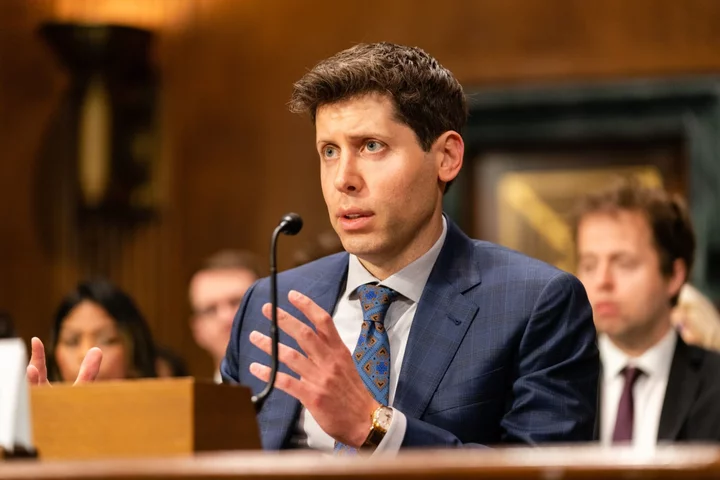
An AI CEO Went to Washington and Asked for Rules: Key Takeaways
The Senate’s first major hearing on artificial intelligence covered everything from the lighthearted marvels of generative AI to
2023-05-17 06:15
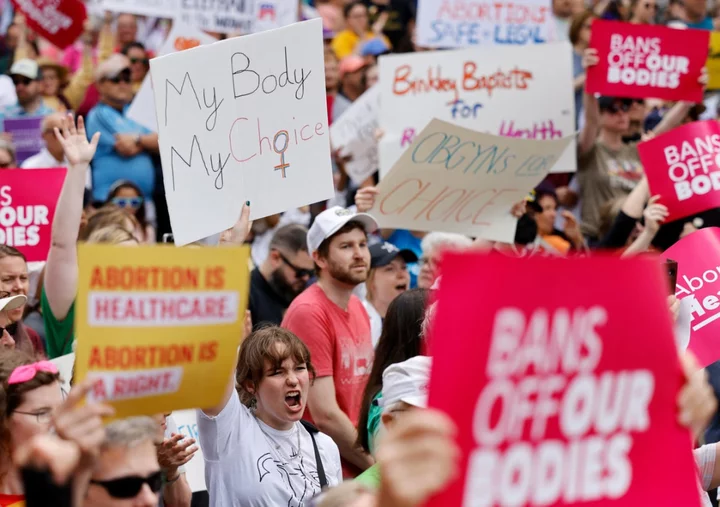
Anti-abortion laws harm patients facing dangerous and life-threatening complications, report finds
Healthcare providers caring for pregnant patients in the months after the US Supreme Court’s decision to strike down Roe v Wade have been unable to provide standard medical care in states where abortion is effectively outlawed, leading to delays and worsening and dangerous health outcomes for patients, according to an expansive new report. In the wake of the Supreme Court’s ruling last year, individual reports from patients and providers have shed some light on the wide range of harm facing pregnant women in states where access to abortion care is restricted or outright banned. But a first-of-its-kind report from the University of California San Francisco captures examples from across the country, documenting 50 cases in more than a dozen states that enacted abortion bans within the last 10 months, painting a “stark picture of how the fall of Roe is impacting healthcare in states that restrict abortion,” according to the report’s author Dr Daniel Grossman. “Banning abortion and tying providers’ hands impacts every aspect of care and will do so for years to come,” he said in a statement accompanying the report. “Pregnant people deserve better than regressive policies that put their health and lives at risk.” The report collected anonymised narratives from providers who observed complications facing their patients. The most common scenario involved preterm pre-labor rupture of membranes (PPRM), in which the amniotic membrane surrounding the fetus breaks. In several of the cases, patients developed a severe infection, including cases that put patients in hospital intensive care units. Patients in many cases were instead sent home and told to return to a hospital when labor started or when they experienced signs of an infection. In one case, a patient returned to a hospital’s intensive care unit two days after her water broke at roughly 16 to 18 weeks of pregnancy in a state where abortion is banned. “The anesthesiologist cries on the phone when discussing the case with me,” the physician wrote, according to the report. “If the patient needs to be intubated, no one thinks she will make it out of the [operating room].” The report notes that “miraculously” the patient survived. Following the termination of the pregnancy, the patient asked the doctor whether any of them broke the law. “She asks me: could she or I go to jail for this?” the doctor said, according to the report. “Or did this count as life-threatening yet?” Providers also described other cases where patients showed evidence of inevitable pregnancy loss, but their care teams had their “hands tied” under state laws. Health providers also submitted stories of patients experiencing ectopic pregnancies. Delays to treat one patient resulted in a ruptured ectopic pregnancy that required surgery to remove her fallopian tube. Another patient was denied an abortion for a Caesarean scar ectopic pregnancy, a life-threatening condition where a pregnancy implants in the scar of a prior Caesarean section. Other physicians reported the inability to treat patients with fetal anomalies and patients who faced delays receiving treatment for miscarriages. “Unfortunately, this report confirms that our fears about abortion bans are valid,” said Dr Chloe Zera, a maternal-fetal medicine specialist and associate professor at Harvard Medical School. “As someone who cares for patients who have high-risk pregnancies, I need to be able to provide care consistent with evidence-based guidelines,” she said in a statement accompanying the report. “This research underscores the completely preventable harm that is now happening to our patients because of barriers to abortion care.” The report also outlines the moral dilemmas facing physicians operating in states or treating patients from states that have outlawed the potentially life-saving care they previously provided. Some physicians said they were considering quitting or relocating, or noted the immense coordination required between health providers in multiple states to treat patients, and outlined the ways in which restrictive state laws have complicated other care unrelated to abortion. In one case, a physician refused to remove an intrauterine device for a patient who was between 10 and 12 weeks pregnant, despite the partially expelled IUD posing a risk for infection or miscarriage. “The doctor did not feel comfortable” removing the IUD, one physician wrote, according to the report. “The context provided was concern over the recent changes in law that create [the] possibility for felony charges for providers causing abortion in our state shortly after the Roe decision was overturned.” During a “heated exchange” among health providers, “the doctor [said] the patient had... been examined by the nurse practitioner, who was unable to visualize the IUD, and that ‘even if I could see it and it was easily removable, I wouldn’t remove it because of the law,’” according to the physician’s description in the report. “Abortion bans that block providers from offering standard medical care have the greatest impact in states like Texas that have some of the poorest indicators of maternal health,” according to Dr Kari White, lead investigator of the Texas Policy Evaluation Project at The University of Texas at Austin. “Pregnant people should be able to rely on their healthcare provider to provide the best possible care, regardless of where they live,” she said in a statement accompanying the report. More than a dozen states, mostly in the South, have effectively outlawed or severely restricted access to abortion care after the Supreme Court’s decision in Dobbs v Jackson Women’s Health Organization last June. Read More Alabama Republicans would charge abortion patients with murder under proposed legislation Louisiana Republicans refuse rape and incest exceptions to state’s sweeping anti-abortion law North Carolina governor vetoes 12-week abortion ban, launching Republican override showdown A Texas man sued his ex-wife’s friends for allegedly helping her with an abortion. Now they’re suing him Supreme Court preserves abortion drug approval as legal case plays out
2023-05-17 01:59
